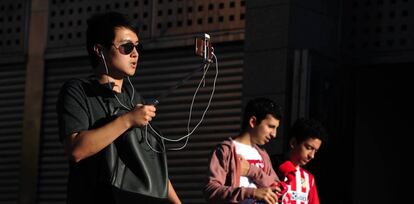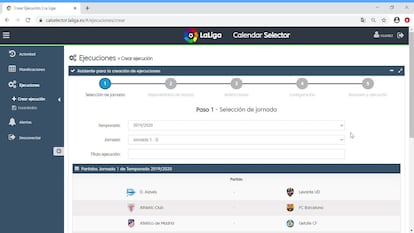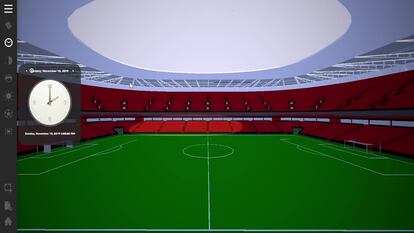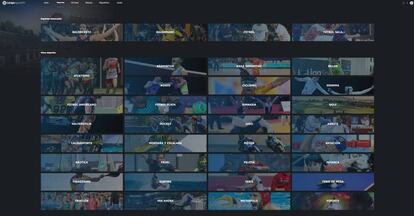The twenty innovations that have changed Spanish football
In the Technology area of LaLiga, around 70 people are working on developing tools that range from setting up the competition calendar to designing anti-piracy systems. More than 20 projects have received certification in research, development and innovation

José Carlos Franco came to LaLiga in November 2017 with 10 years of experience in the banking world, specifically in the field of technology and data intelligence. He joined the elite Spanish football organisation to create a new area, BI & Analytics, which started up with a team formed by him and one other person. Less than three years later, he now heads the Technology department of LaLiga, which has around 70 employees. “It’s not just the number of people but also the way we work. We use the same methodologies that a large technology company might use. We have implemented their way of working in our industry,” says Franco.
And they've done it with flying colours: more than 20 of LaLiga's technology department projects have been certified by the Agencia de Certificación de Innovación Española (Spanish Innovation Certification Agency, or ACIE) and by the European Quality Assurance (EQA) agency. LaLiga's commitment to research, development and technological innovation (R&D+i) ranges from the Calendar Selector tool for optimising match schedule selection to complex anti-piracy systems. "Beyond the quality of these awards, we are proud of the quantity and diversity of the solutions that have been certified," adds Franco. "These are technologies that are very different from each other: artificial intelligence, streaming, illicit content tracking... We seek to apply the best of each technological field in different business areas," he says.
Spanish regional and state administrations provide companies with a series of incentives to encourage innovation. Those received by LaLiga involve tax deductions that help to continue investing in technology and that benefit the economy of the 42 clubs that form part of it. Franc Palomino, a partner at EY, the global firm that helps LaLiga accredit its innovative projects and obtain these recognitions, explains: "The documentation we present is analysed by technical experts who consider the new technological developments and also determine if the expense incurred is reasonable and congruent with the achievement of these objectives". Palomino, who has been working for 20 years in the management of administrative incentives to promote innovation in companies, adds: "LaLiga is truly a pioneer. In the world of sport you could say that it is one of the most advanced companies at an international level. It is side by side on the cutting edge of innovation with highly innovative sectors such as pharmaceuticals."
The EQA is one of the 10 agencies in Spain that grant this type of certification and one of the most important. Raquel García Álvarez, director of the company's R&D+i certificates, gives some clues as to how they are obtained: "First the client tells us what they have done and we check to see if the leap between what already existed and what they have achieved is significant. Is there a change regarding what was the current state of the art?" According to García Álvarez, this leap may be made internally, but it may not be so important for other sectors. "In that case, we would be talking about technological innovation," she says. If the project analysed by EQA involves a jump at an external level, in relation to other industries as well; if it is something that no other company had been doing, then it is considered an advance in R&D (Research and Development). "But there is also a very decisive element, which means not every project is considered. There has to be a risk that it might turn out well or badly; that's why it's called research and development. We call this risk inherent in uncertainty," explains García Álvarez, who has worked in this field for more than ten years. "At first, Ibex35 companies were the main candidates for these certifications, but now 70% of the proposals come from SMEs."
What kind of projects have received these certifications? The Calendar Selector, the tool used to design competition schedules, and the Marauder, Lumière and Tyche anti-piracy systems created by LaLiga have received research and development certification. Other projects, including OTT LaLigaSportsTV (streaming), the Mediacoach game analysis system and the online portal where clubs can manage data and information have received certification for technological innovation. "We are proud to receive this type of certification. We are committed to innovation and these recognitions are a boost to continue this commitment in the medium and long term," says Javier Tebas, president of LaLiga.

Calendar selector: 70 variables determine kick-off times
How do you decide what time my team plays? This question, which can drive any fan crazy, has a complex yet simple answer. Simple because it is the result of an operation that takes just a few minutes, and complex because of the number of factors involved: up to 70 variables determine kick-off times.
Since the 2018/2019 season, the schedules have been designed based on Calendar Selector, a technological tool that predicts the best time for the ten matches played each day to achieve maximum attendance in the stadiums and maximum national, international and bar audiences. It does so based on an enormous amount of data: stadium attendance records, the difference in points between the teams playing each other, and whether one of the contenders has played in a European competition in the same week, among many other data points. The result of the analysis, which in just a few seconds tracks nearly 160,000 possible options, is a report that combines each model’s optimal solutions to offer a range of alternatives that are then studied by the directors of LaLiga.
Although people always have the last word, the system leaves little room for chance or improvisation. "Human intervention is less than 0.34%. The options given by the tool are multiple, some of them optimal and others not, but it shows you only the optimal ones. All these optimal options vary very little from one another and that is why, whatever you choose, it will be correct," explains Victor Suárez, the person responsible for the tool.

The return of football on 11th June posed the challenge of compressing 220 matches into just over 60 days. This was a very particular context that gave additional weight to factors such as temperature or the minimum requirement of two days' rest to decide when to play the matches, but which also served to highlight other innovations such as Sunlight Broadcast. This program, capable of recreating the incidence of sunlight through a 3D image of all the stadiums in the competition, is used to establish the exact position of the sun during any match in order to help minimise its effects on viewers and broadcasting.
Anti-piracy: when the competition calls for help
The organisation created the Content Protection Department, headed by Emilio Fernández, some five years ago with three people. It now employs more than 20 computer engineers and experts in cybersecurity and social networks who are developing their own working model that is unequalled in the other major leagues.
Fernández assumed that, from the inside, they could do better and his team developed a software package, Marauder, capable of being permanently active in the tracking of content illegally disseminated on the internet. Thanks to this software, and working with some twenty social networks, they have managed to detect more than one million illegal videos on the net and 37 million downloads of illegal apps, among other things. "LaLiga is investing more and we are finding more things, but on the forums, people are already starting to warn: 'Don't upload videos because they will remove them and close your account", says Fernandez.
In addition to Marauder, his team has created several other tools. One of them, Lumière, is a secure and anonymous platform that investigates different websites that share illegal content, obtains evidence, investigates the technological infrastructures that support it, identifies the offender and prepares technical reports on these environments to be used in legal proceedings. LaLiga has ceded this tool to the Ministry of Culture, but has also signed agreements with Dorna Sports, the exclusive owner of the organisational, commercial and audiovisual rights of the Motorcycle World Championship (which also owns the rights to the World Superbike Championship and the MotoE World Cup), and with the Pro League, the top competition level in the Belgian football league, to provide these services, which then provide another source of income to Spanish football. Franco, the technology director, says: "We have such specialised products that work so well that other organisations ask to use them."
LaLiga has also developed a tool to monitor the betting markets in Spanish football and to combat potential collusion. This is Tyche, software based on artificial intelligence that detects in real time possible signs of fraud in professional and amateur football matches played in Spain. In a single day, the tool is capable of analysing up to three million pieces of data.
LaLigaSportsTV, all your favourite sports on one screen

In September 2018, LaLiga launched LaLigaSportsTV, an app that offers free, high-definition live broadcasts of more than 30 sporting disciplines. The platform aims to be the benchmark audiovisual service for live sport. Most of the sports offered have their own channel. In addition to the live broadcasts, the user will find summaries, news reports and documentaries. The platform works on its own website and in the app on iOS and Android smartphones, tablets, smart TVs and also enables mirroring [the system that allows the signal to be sent from a mobile device to a television] for Chromecast, Apple TV and Samsung.
Jesús Nacimiento joined LaLigaSportsTV's technical team exactly one year ago. A 44-year-old computer engineer, Nacimiento came to LaLiga OTT from the Olympic Channel, the streaming channel of the Olympic Games. Since then, his team has grown from one person to 16. This is the first time he has participated in a project that has received certification for technological innovation. Nacimiento explains what the main advances of the platform were during this time: "We were able to collect and exploit data to focus marketing campaigns and encourage consumption of lesser known sports as well as develop a recommendation engine for users who access LaLigaSportsTV based on their tastes." Some of the facets they are working on outperform even companies that have been in broadcasting all their lives: "The biggest innovation is in supporting cloud video workflows. This is something we are pioneering."